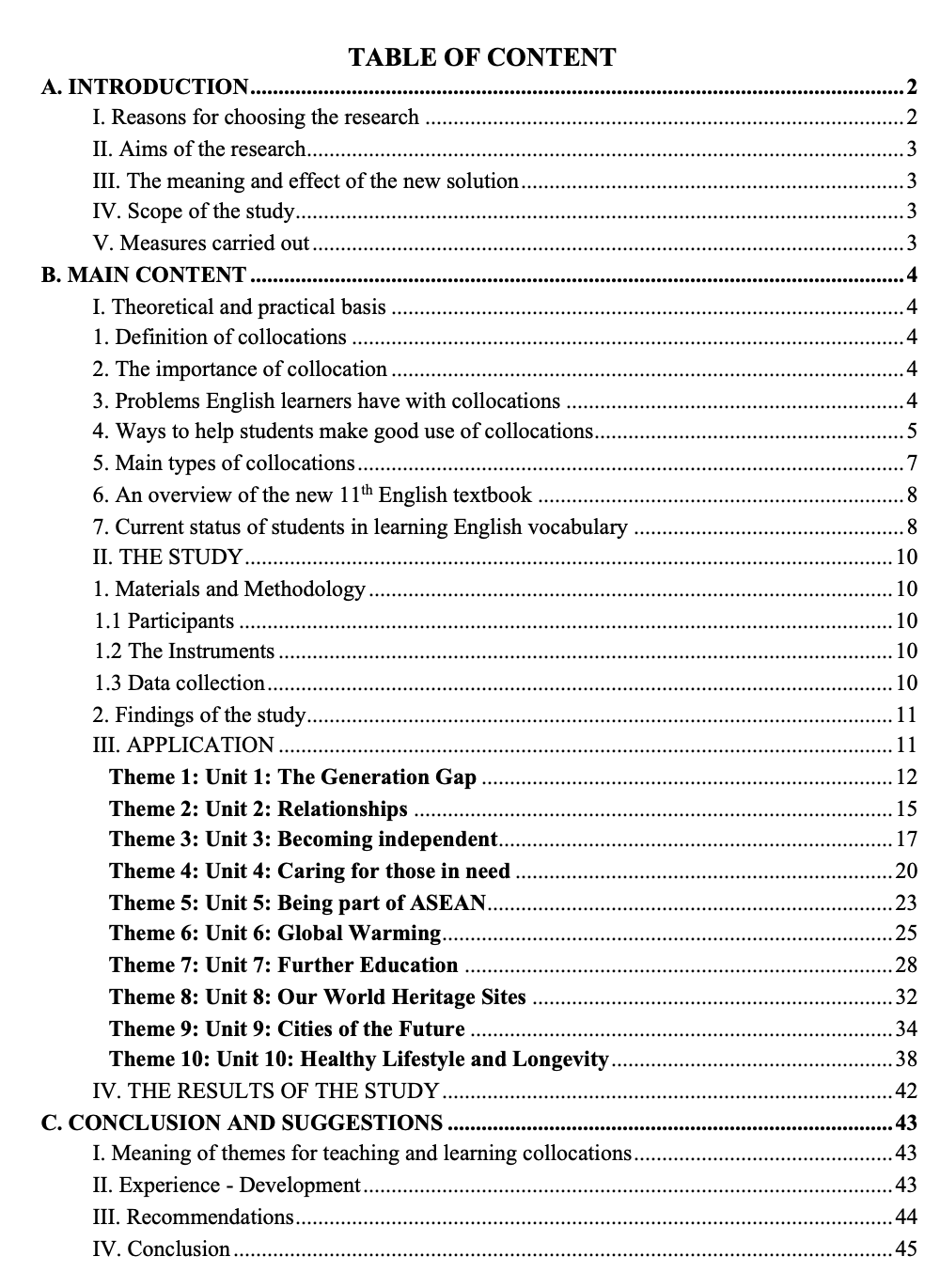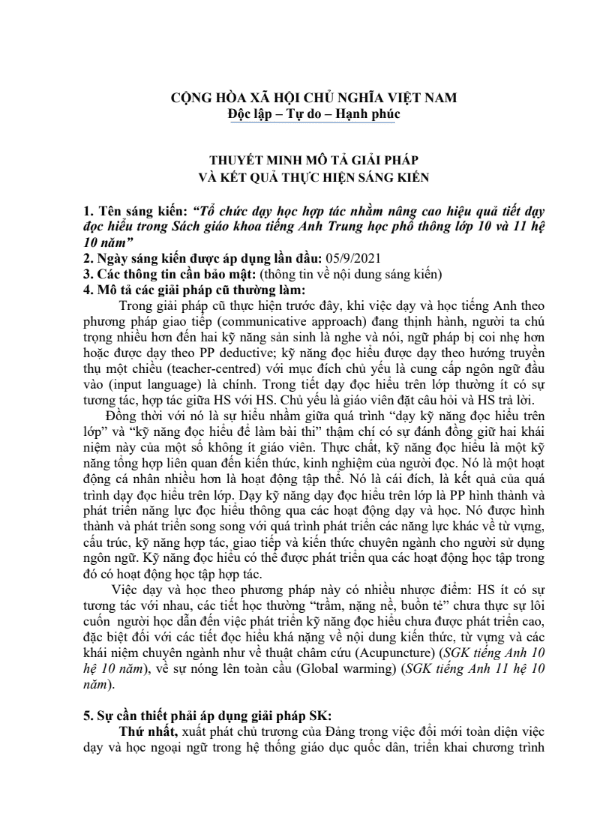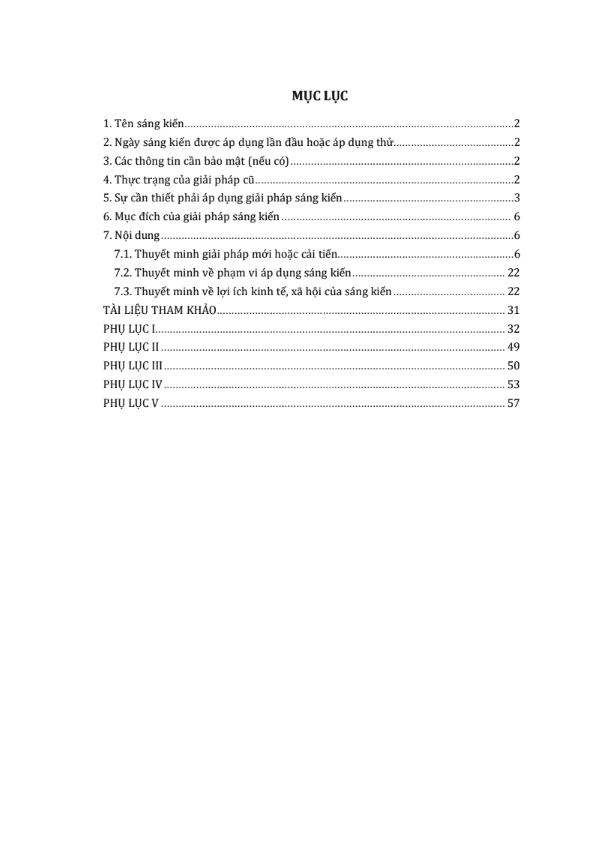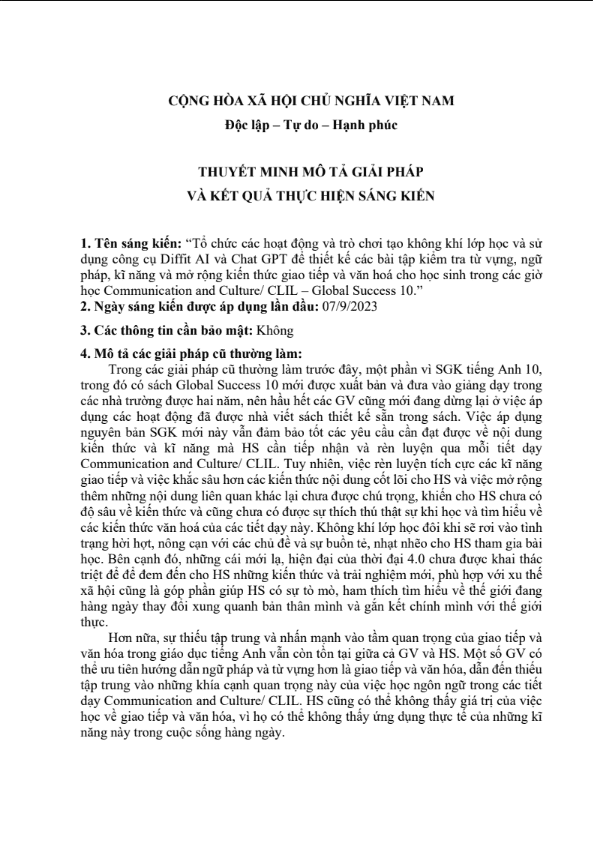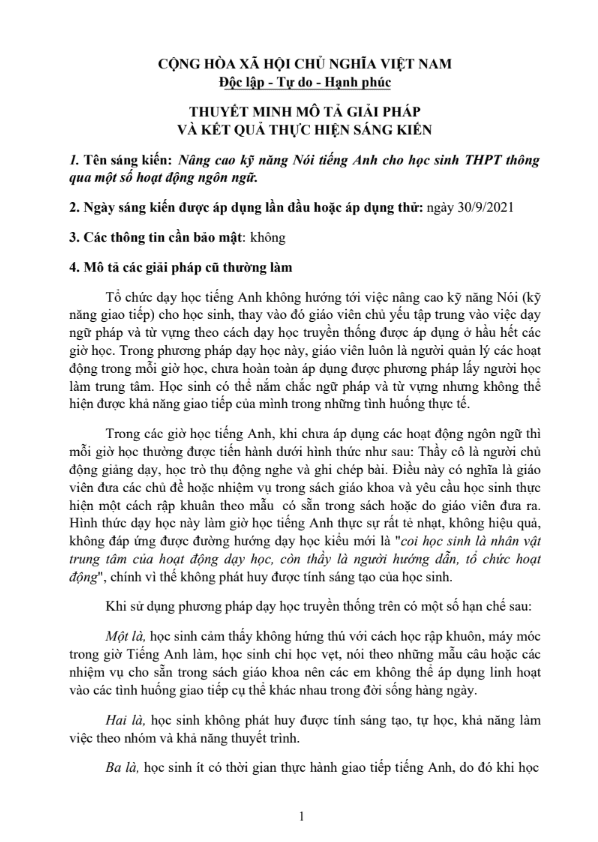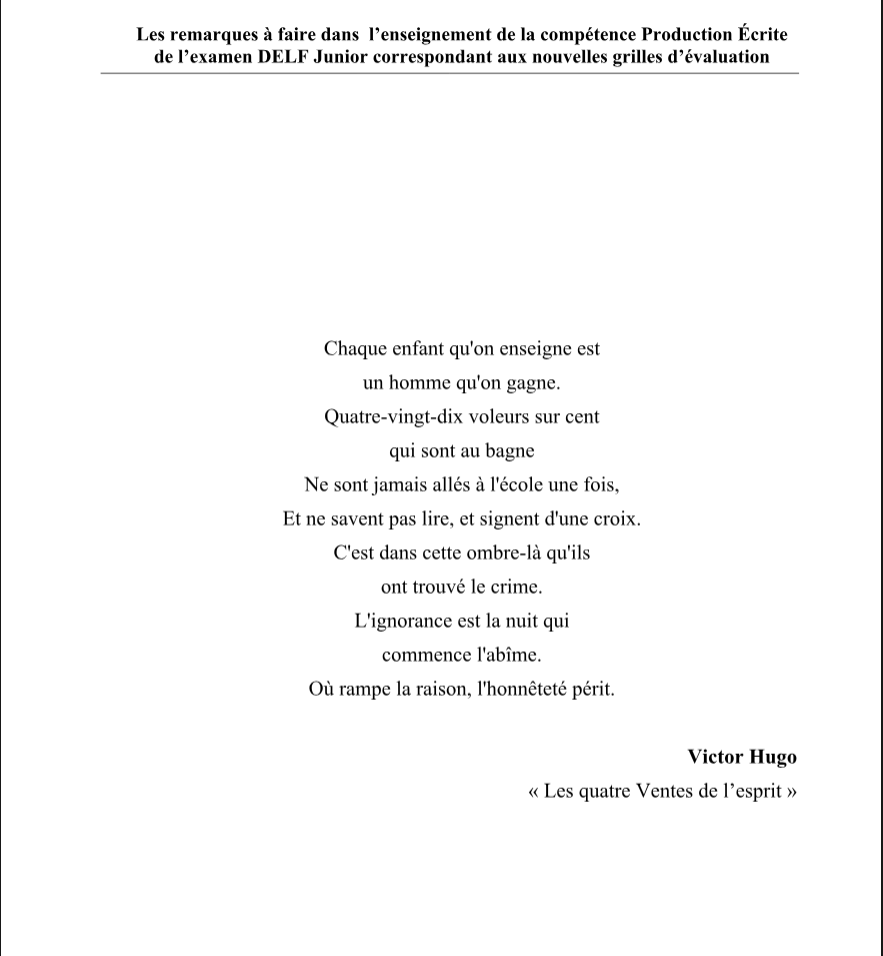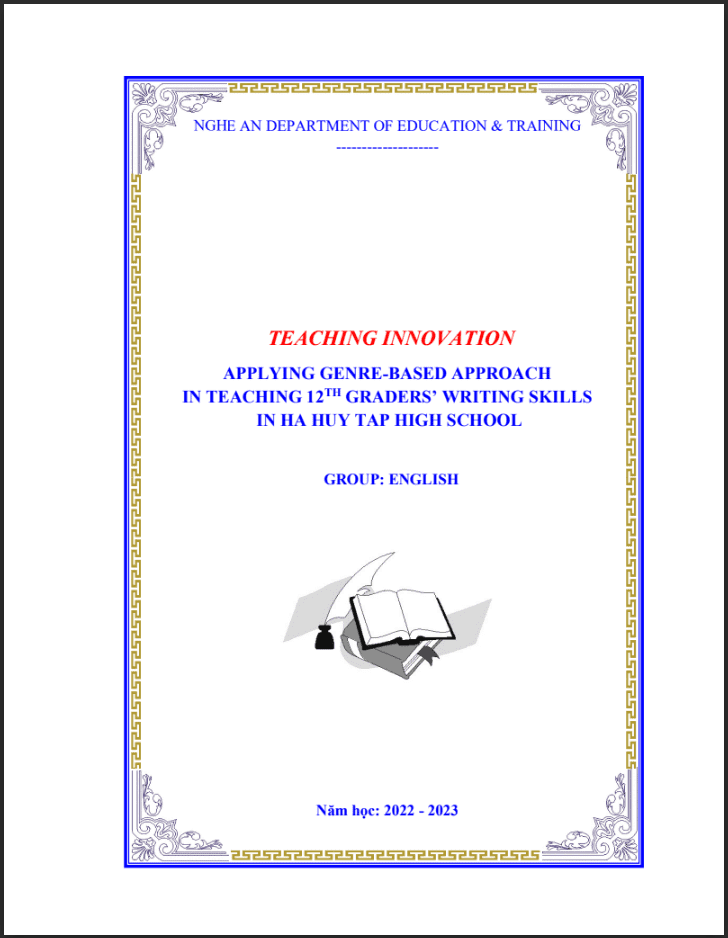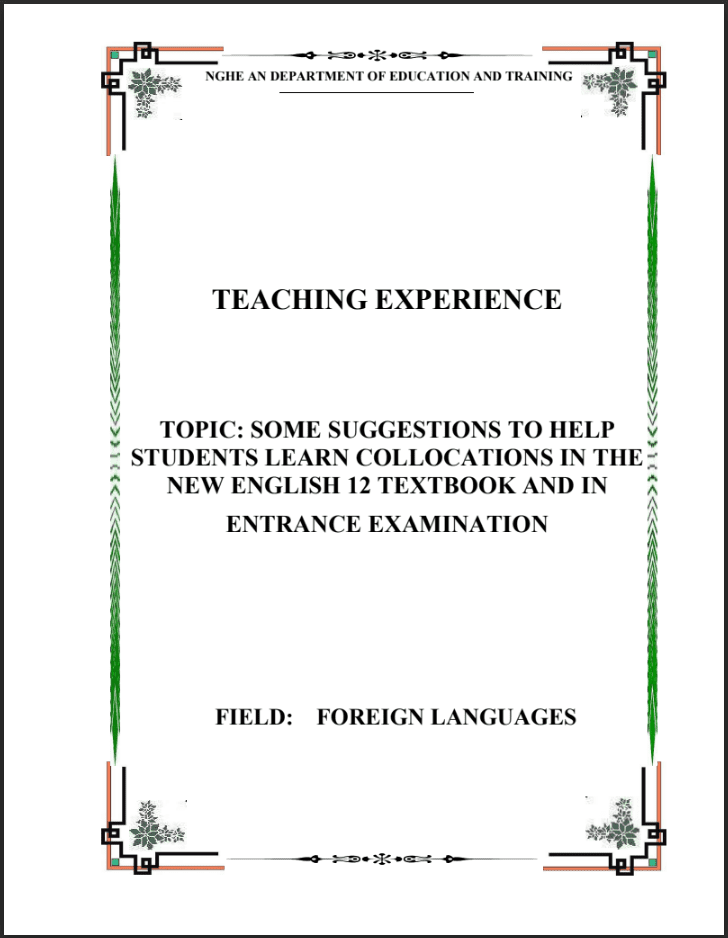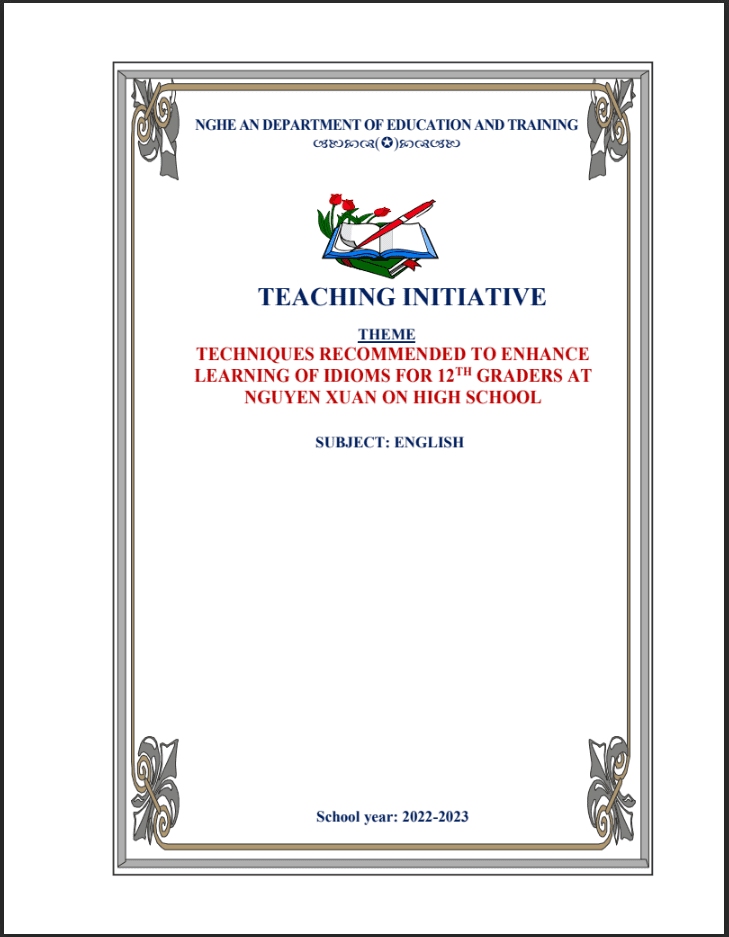SKKN Some experience in teaching students to learn collocations in the new 11th English textbook
- Mã tài liệu: MP0044 Copy
| Môn: | Tiếng anh |
| Lớp: | 11 |
| Bộ sách: | |
| Lượt xem: | 741 |
| Lượt tải: | 5 |
| Số trang: | 53 |
| Tác giả: | Lê Thị Quế |
| Trình độ chuyên môn: | Cử nhân đại học |
| Đơn vị công tác: | THPT Lê Viết Thuật |
| Năm viết: | 2021-2022 |
| Số trang: | 53 |
| Tác giả: | Lê Thị Quế |
| Trình độ chuyên môn: | Cử nhân đại học |
| Đơn vị công tác: | THPT Lê Viết Thuật |
| Năm viết: | 2021-2022 |
Sáng kiến kinh nghiệm “SKKN Some experience in teaching students to learn collocations in the new 11th English textbook” triển khai gồm các biện pháp nổi bật sau:
– Depending on the number of collocations included in each lesson, I used elective periods, for example “Vocabulary related to Lesson 1,2,3, ….” to teach and test collocations through the games and exercises. If the lesson hasn’t completed, I will use a part of the “Practice Test” period to help students with collocation exercises.
– When teaching vocabulary, I applied methods such as: giving an English word and asking students to find a word that can be combined with that word to get a phrase according to each topic of the lesson; or writing the English transcription and then telling students to write down the phrase; providing a picture and asking students to give a phrase – collocation.
– I also used games in English such as crossword, noughts and crosses, who wants to be a millionaire?, fishing game …and so on.
– Then the teacher provided the following table to students so that the students could use it for a long time in the process of learning English.
Mô tả sản phẩm
A. INTRODUCTION
I. Reasons for choosing the research
In recent years, English has become very popular language around the world. There are more than 700 million English users in the world which is a terrible number to prove the importance of English. Also, learning English becomes easy with everything around our life. We can study with Internet which helps us chat with foreign friends and search information. We can also walk the park and exchange with foreign travelers. A crucial reason for people to travel to English speaking countries for learning English is that learning from native speakers will enable them to acquire the level of proficiency required to clear international English tests. Subsequently, a good level of English helps people to acquire a resident status in the first world countries. For example, students who want to go abroad to study need the IELTS cerfificate with the diferent levels from 5.5 to 7.0. In Viet nam, some universities require students having this IELTS cerfificate will be admitted to directly. Learning English not only provides access to information but also open a world of opportunities.
In the IELTS Reading test, Vocabulary is an important factor for candidates to be able to read and understand information in the Reading test. In addition to common vocabulary, the ability to understand and use collocations also helps candidates increase the speed and accuracy of information processing when reading text.
In the IELTS Speaking and Writing, These are two exams that require candidates to actively show off their vocabulary to get high scores. Indeed, Lexical Resource – vocabulary is one of the four criteria for determining the score of the Speaking and Writing test. Indeed, in Band 7 of the Lexical Resources criterion in the Speaking test, candidates are required to “uses some less common and idiomatic vocabulary and shows some awareness of style and collocation”, and for the Writing test it is “uses less common lexical items with some awareness of style and collocation”- that is, in addition to using less popular words, candidates must pay attention to collocations and idioms in the context and how to combine words. Thus, learning collocations and idioms is essential for candidates taking the speaking and writing exams, especially those aiming to score 7.0 or above in 2 skills.
And the English test for the national high school exam is no exception for using collocations. The core of the test is the vocabulary issue. But not discrete vocabulary, they will be collocations. Please assume that if the English test does not have any new words for students, what will the results be? Surely they do not miss the opportunity to get the perfect score, the score that both makes them proud and creates a huge competitive strength for admission to their dream university. Since vocabulary is the central content of the language test, when there are good vocabulary, comprehension reading becomes easy to understand, grammar lesson is easier to do, and phonetic lesson is also easy to judge …
Indeed, after many teaching years at high school and help students to learn skills, I realized that most of the students cannot express exactly what the collocations really mean and they find it difficult to have good word choices, Moreover, to write an effective paragraph or essay and to speak a sentence correctly and fluently requires students to have collocations. Therefore, to help students master the words learned to practice skills and apply them to the tests is a very important task that made me worry and decided to implement the topic: “SOME
EXPERIENCE IN TEACHING STUDENTS TO LEARN COLLOCATIONS IN THE NEW 11th ENGLISH TEXTBOOK”. I hope that these experiences contribute to complement and enrich the teaching methods of colleagues.
II. Aims of the research
- To help students improve the skills of learning vocabulary through collocations. – To encourage students to confidently cope with this type of problem in order to learn words by heart effectively.
- To make students be aware of the importance of vocabulary in English and motivate them practice learning vocabulary.
- To use vocabulary to communicate, apply to the tests.
III. The meaning and effect of the new solution
– Students will remember new words quickly, acquire a lot of vocabulary and know to use vocabulary accurately in a variety of situations. Besides, they can facilitate the four language skills: speaking, reading writing and listening and even the international testing systems.
IV. Scope of the study
– In this research, I just focus on the 11th grade students at Le Viet Thuat High School, especially students in class 11A1, 11D2.
V. Measures carried out
- Study common types of collocations
- Survey questionnaire and class observation
- Provide the vocabulary through collocations of units in the new 11th English textbook.
- Provide some application exercises containing collocations and guide students how to cope with.
- Read reference books, discuss with other teachers, apply in teaching and getting experience from the teaching in the class.
B. MAIN CONTENT
I. Theoretical and practical basis
1. Definition of collocations
According to the Oxford dictionary, collocation is defined as “a combination of words in a language that happens very often and more frequently than would happen by chance”.
Cambridge Dictionary defines collocation as “a word or phrase that is often used with another word or phrase, in a way that sounds correct to people who have spoken the language all their lives, but might not be expected from the meaning”. Thus, collocation is the natural combination of words into phrases according to native habits.
Collocations may seem natural to native writers and speakers, but are not obvious to non-native English speakers. For instance, the adjective “dark” collocates with “chocolate”, but not with “tea”.
2. The importance of collocation
The mastery of collocation has a significant effect on learner’s effective use of language:
- Help learners use words more accurately, avoid mistakes in written language as well as in communication
For example: You’ll make (NOT do) fewer mistakes
- Help learners use language in a more natural and flexible way
For example: By using the phrase “make a complain” instead of “create a complain”, the learners not only express their ideas to the listener but also use natural language like native speakers.
- Help learners have a richer vocabulary. Instead of repeating common words like “very”, “good”, “nice”, learners can expand their vocabulary by learning specific collocations in each case.
For example: Instead of using “very happy”, the speaker can learn more “blissfully happy” collocation to express happy feelings. Or instead of “it was very cold and very dark”, they can say “it was bitterly cold and pitch dark”.
- Help you have a lot of choices and expressions.
- Help your brain to remember and use language in the best way
3. Problems English learners have with collocations
One of the biggest problems with collocation is its arbitrary nature: there is no “rule” or reason that it’s “in regard to” and not “on regard to”- it just is.
- Lack of awareness: students need to have a problem brought to their attention before they even know it is a problem. They may be unaware that some words go together better than others, especially as this doesn’t tend to be emphasized in language instruction.
- First language transfer is another English Speaking Language problem with collocation – students transfer the appropriate collocation from their first language.
“Make” and “do” confusion is common, for example, among students of Latin language backgrounds: e.g., “make my homework” rather than “do my homework.”
- Common errors from students’ writing: Students often find it hard to produce a good writing. One of the reasons for that is they cannot find the right word. Another lies in the fact that they cannot write in as accurate a way as they expect because they fail to get an adjective or an adverb to collocate with the noun or the verb used.
If students only learn these individual words, although learners can remember and understand the meaning of the words, it is difficult to understand the use and combinations of words in sentences when combined with other words.
Consequently, although the learner can recall the correct vocabulary in the context in which it is being expressed, wrongly combining one word with other words makes the language unnatural and even inaccurate, and many cases that make it difficult to convey information.
4. Ways to help students make good use of collocations
To Learn Collocations effectively, there are no rules. The students can apply the vocabulary learning strategies that they find effective to this phrase learning. And the most effective way is still to keep it in mind. In fact there are a lot of ways to learn them.
- Encourage your learners to read English texts. Be sure to include authentic materials into your lessons so that your students are exposed to natural language as much as possible. When teaching vocabulary, don’t only focus on meaning, form and pronunciation but also focus on common collocations with the words in question. Be sure to draw your students’ attention to the occurrence and usage of collocations in any texts you use in class.
- Encourage students to create their own collocation dictionary. You can also create cards with common phrases on the walls around the classroom so your students can see them instantly when they are speaking in English.
- Learn collocation through book, press, and reproduction. You should learn this way; read books and magazines a lot to be able to record collocations by topic. And this recording will help you remember very quickly as well as help you have the right vocabulary for yourself.
TÀI LIỆU LIÊN QUAN
- 7
- 105
- 1
- [product_views]
- 5
- 173
- 2
- [product_views]
- 4
- 165
- 3
- [product_views]
- 4
- 129
- 4
- [product_views]
100.000 ₫
- 6
- 434
- 5
- [product_views]
100.000 ₫
- 2
- 507
- 6
- [product_views]
100.000 ₫
- 9
- 546
- 7
- [product_views]
100.000 ₫
- 4
- 409
- 8
- [product_views]
100.000 ₫
- 2
- 595
- 9
- [product_views]
100.000 ₫
- 0
- 538
- 10
- [product_views]

